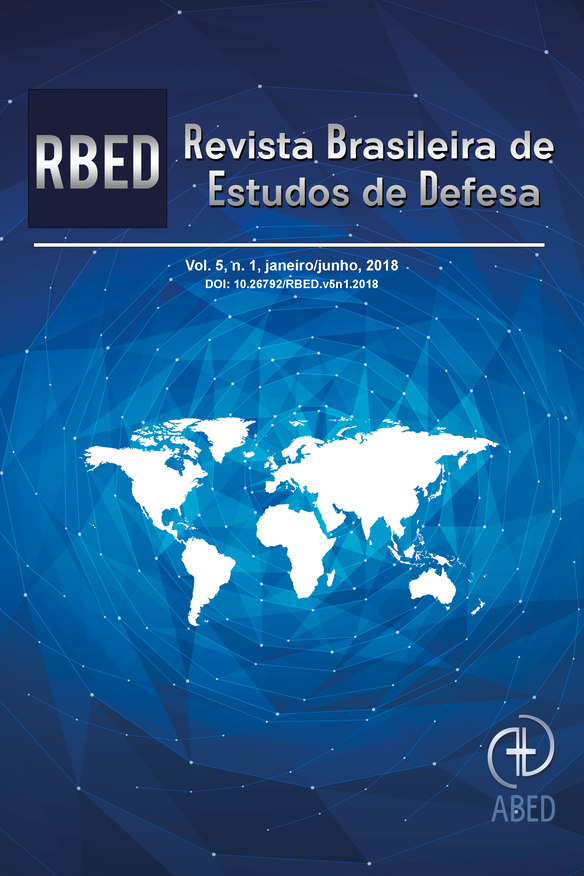Geopolítica e energia na região do Cáspio
DOI:
https://doi.org/10.26792/rbed.v5n1.2018.75074Palavras-chave:
Geopolítica, Energia, Eurásia, CáspioResumo
O artigo trata da relação entre a Geopolítica e a região do Cáspio, com enfoque em seus recursos energéticos. Com este fim, o trabalho problematiza a ideia do retorno da geopolítica, buscando evidenciar como, na região, a abordagem sempre imperou, tanto como lente analítica quanto como framework para a política das grandes potências.
Downloads
Referências
Adams, Terence. 2004. Caspian energy development. In: Akiner, Shirin. The Caspian Politics, energy and security. New York: Routledge, 79-94.
Agnew, John. 2003. Geopolitics: re-visioning world politics. 2. ed. Nova Iorque: Routledge.
Akiner, Shirin. 2004. Caspian intersections: contextual introduction. In: AKINER, Shirin. The Caspian Politics, energy and security. Nova Iorque: Routledge, 2-12.
Brzezinski, Zbigniew. 1997. The Grand Chessboard: American primacy and its geostrategic imperatives. Nova Iorque: Basic Books.
Cohn, Marjorie. 2000. “Cheney’s ‘Black Gold’: Oil Interests May Drive U.S. Foreign Policy”. Disponível em: <http://articles.chicagotribune.com/2000-08-10/news/0008100507_1_caspian-oil-caspian-sea-gas-journal>. Acesso em: 15 out. 2016.
Cooley, Alexander. 2012. Great Games, Local Rules: The New Great Power Contest in Central Asia. Nova Iorque: Oxford University Press.
Dekmejian, R. Hrair e Hovann H Simonian. 2003. Troubled Waters: The Geopolitics of the Caspian Region. Nova Iorque: I.B. Tauris & Co Ltd.
EIA (Energy Information Agency). 2013. Overview of oil and natural gas in the Caspian Sea region. Disponível em: <http://www.eia.gov/beta/international/regions-topics.cfm?RegionTopicID=CSR>. Acesso em: 14 set. 2016.
EIA (Energy Information Agency). 2015. International Rankings. Disponível em: <http://www.eia.gov/beta/international/?src=-f3>. Acesso em: 14 set. 2016.
Fuser, Igor. 2013. Energia e Relações Internacionais. São Paulo: Saraiva.
Grygiel, Jakub J. 2006. Great powers and geopolitical change. JHU Press.
Kaplan, Robert D. 2013. A Vingança da Geografia: A construção do mundo geopolítico a partir da perspectiva geográfica. Rio de Janeiro: Elsevier.
Klare, Michael. 2002. Resource Wars: the new landscape of global conflict. Nova Iorque: Owl Books.
Klare, Michael. 2006. Sangre y Petróleo: Peligros y consecuencias de la dependencia del crudo. Barcelona: Ediciones Urano.
Klare, Michael. 2008. Rising Powers, Shrinking Planet: How scarce energy is creating a new world order. Oxford: Oneworld.
Kubicek, Paul. 2013. “Energy politics and geopolitical competition in the Caspian Basin.” Journal Of Eurasian Studies, [s.l.], 4 (2): 171-180.
Kucera, Joshua. 2014. After Summit, Caspian Sea Questions Linger. Disponível em: <http://thediplomat.com/2014/10/after-summit-caspian-sea-questions-linger/>. Acesso em: 03 mai. 2016.
Labban, Mazen. 2009. “The Struggle for the Heartland: Hybrid Geopolitics in the Transcaspian.” Geopolitics, [s.l.], v. 14, n. 1, p.1-25, 13.
Mackinder, Halford J. 1904. “The Geographical Pivot of History.” The Geographical Journal, [s.l.], 23 (4): 421-437.
Mackinder, Halford J. 1919. Democratic ideals and reality: a study in the politics of reconstruction. Nova Iorque: Henry Holt And Company.
Milne, David. 2010. “America’s ‘intellectual’ diplomacy.” International Affairs, [s.l.], 86 (1): 49-68.
Naumkin, Vitaly. 2001. Russia’s national security interests in the Caspian region. In: Chufrin, Gennady (Ed.). The Security of the Caspian Sea Region. New York: Oxford University Press, 119-135.
Newman, Sheila (Ed.). 2008. The Final Energy Crisis. 2. ed. Londres: Pluto Press.
Obama. [Discurso]. 2007. Obama: I’ve learned an immense amount from Dr. Brzezinski. Disponível em: <https://www.youtube.com/watch?v=ASlETEx0T-I>. Acesso em: 20 jun. 2016.
Republic of Kazakhstan. 2018. COMMUNIQUE of the 51st Meeting of the Special Working Group on the Development of the Convention on the Legal Status of the Caspian Sea at the Level of Deputy Foreign Ministers of the Caspian Littoral States. Disponível em: <http://mfa.gov.kz/en/content-view/kommunike-51-go-zasedania-specialnoj-rabocej-gruppy-po-razrabotke-konvencii-o-pravovom-statuse-kaspijskogo-mora-na-urovne-zamestitelej-ministrov-inostrannyh-del-prikaspijskih-gosudarstv>. Acesso em: 30 mai. 2018.
Teixeira, Tatiana. 2009. “A Influência dos Think Tanks no Governo Bush e no Início da Era Obama.” In: II Simpósio De Pós-Graduação Em Relações Internacionais Do Programa "San Tiago Dantas" (Unesp, Unicamp E Puc/Sp), 2., São Paulo. Anais do II Simpósio de Pós-Graduação em Relações Internacionais do Programa “San Tiago Dantas” (Unesp, Unicamp e PUC/SP). São Paulo: PPGRI San Tiago Dantas, 1-19. Disponível em: <http://www.santiagodantassp.locaweb.com.br/br/simp/artigos2009/tatiana_teixeira.pdf>. Acesso em: 2 jul. 2016.
Van Apeldoorn, Bastiaan e Naná De Graaff. 2016. American Grand Strategy and Corporate Elite Networks: The Open Door since the end of the Cold War. Nova Iorque: Routledge.
Yakovenko, Alexander. 2014. Caspian Summit: Successful cooperation in ‘oasis of peace’. Disponível em: <https://www.rt.com/op-edge/193960-caspian-summit-sea-asia/>. Acesso em: 03 mai. 2016.
Zabortseva, Yelena Nikolayevna. 2012. “From the forgotten region to the great game region: On the development of geopolitics in Central Asia.” Journal Of Eurasian Studies, [s.l.], 3 (2): 168-176, jul.
Downloads
Publicado
Como Citar
Edição
Seção
Licença
Autores que publicam nesta revista concordam com os seguintes termos:1) Autores mantêm os direitos autorais e concedem à revista o direito de primeira publicação, com o trabalho simultaneamente licenciado sob a Licença Creative Commons Attribution que permite o compartilhamento do trabalho com reconhecimento da autoria e publicação inicial nesta revista.
2) Autores têm autorização para assumir contratos adicionais separadamente, para distribuição não-exclusiva da versão do trabalho publicada nesta revista (ex.: publicar em repositório institucional ou como capítulo de livro), com reconhecimento de autoria e publicação inicial nesta revista.
3) Autores têm permissão e são estimulados a publicar e distribuir seu trabalho online (ex.: em repositórios institucionais ou na sua página pessoal) a qualquer ponto antes ou durante o processo editorial, já que isso pode gerar alterações produtivas, bem como aumentar o impacto e a citação do trabalho publicado (Veja O Efeito do Acesso Livre).





